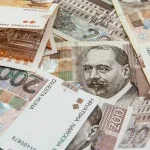December the 1st, 2023 – This week in Croatian politics, former prominent figures in Croatian politics come forward to discuss food prices, healthcare debts are set to be restructured, inflation is finally heading in the right direction, and more.
The former economy minister says there’s four reasons as to why Croatia’s food prices are so high

Former Economy Minister Goranko Fižulić was recently a guest on N1 television/televizija, where he commented on the announced sale of Fortenova, as well as the economic situation in Croatia as a whole. Goranko Fižulić first began to explain why Croats typically spend more on food than the entire European Union average. “There’s nothing very strange about that, we’ll spend less of our monthly salaries on food when we earn more and become richer. There are several reasons as to why we do this, the first is whether there is a market match between food sellers and buyers. You have the example of neighbouring Slovenia, where the market competition is led by Lidl and Hofer, and then you see prices fall,” he said.
“We recently found out that Fortenova is going to be sold to one owner. Let’s go back six years to when the former extraordinary commissioner of the Croatian Government, Ante Ramljak, said that Agrokor would be broken down into factors and that it wouldn’t be a systemic risk for Croatia. We can see that that didn’t happen. Back then, there was a chance for the state to break up Konzum as the biggest market competitor in Croatia, and if that had actually occurred, the price level in Croatia would be lower than it is now,” Goranko Fižulić added.
You can read more by clicking here.
BORIS VUJČIĆ: INFLATION is HEADING IN the RIGHT DIRECTION

Boris Vujčić, the Governor of the Croatian National Bank (CNB) has revealed that although inflation is heading in the desired direction, the path isn’t going to be a quick one. Nor will it be smooth.
There’s something known as the “iron rule of forecasting”, coined by the American economist Edgar Fiedler: No one can escape the iron rule that once you make a forecast, you know you’re going to be wrong; you just don’t know when and in which direction! This has manifested itself unusually cruelly here in Croatia over the past couple of years. A series of unusual disturbances affected the functioning of economic mechanisms and made most projections obsolete, often at the very time of their publication. Inflation projections were particularly wrong, and since mid-2021 they have persistently and noticeably exceeded the projections.
However, professional forecasters – including those from central banks – have partially repaired their damaged credibility over more recent months. Since it peaked at the end of last year, the downward trajectory of inflation in the Eurozone has strengthened, as projections have repeatedly predicted it would.
That said, the process of inflation returning to the target will not go smoothly or rapidly. Inflation will thus continue to oscillate from month to month due to the interplay between the still elevated uncertainty and the prices of energy and raw materials, as well as the “washing out” of past volatility from annual inflation rates.
You can read more by clicking here.
CROATIAN ECONOMY GROWTH is currently ABOVE the EU AVERAGE

Thanks to the increase in consumption and investments, the Croatian economy growth was confirmed in the third quarter of this year, for the eleventh quarter in a row. This will certainly give those in Croatian politics, particularly the leading party, a spring in their step. The economy grew by 2.8 percent on an annual basis, faster than in the previous quarter as well. The Croatian Bureau of Statistics (CBS) published the first estimate on Tuesday, according to which the gross domestic product (GDP) grew by 2.8 percent in real terms in the third quarter compared to the same period last year. This represents more rapid growth than in the second quarter of this year, when GDP grew by 2.6 percent. This is the eleventh quarter in a row that the economy has grown.
According to CBS data, household consumption, which is the largest component of GDP, increased in the third quarter by 3 percent compared to the same period last year, faster than the 2.1 percent growth in the previous quarter.
Gross investments in fixed capital increased by 6.1 percent on an annual basis, significantly faster than in the previous quarter, when growth amounted to 4.2 percent. Government consumption also increased, by 2.1 percent, after having strengthened by 6.8 percent in the previous quarter. On the other hand, exports of goods and services decreased in the third quarter by 8.5 percent on an annual basis, significantly more than the 0.7 percent decline in the previous quarter. At the same time, the export of goods decreased by 20.4 percent, and the export of services by 0.5 percent.
The CROATIAN GOVERNMENT is planning TO PLACE TIGHTER CONTROLS ON DIGITAL PLATFORMS

Since the arrival and blooming popularity of digital platforms such as Uber, Bolt Food, Wolt, Glovo and others, disorganisation and misuse have been rife. Many in Croatian politics have had a lot to say about this, and the government now hopes to be among the first in the EU to bring proper order and control to the platforms which don’t always follow good practices. The emergence of digital platforms has been very visible over the last several years. The most famous of them currently operating here in Croatia are Uber, Bolt and Glovo and Wolt. Unfortunately, the market has become a mess with workers who have been left almost entirely unprotected. Croatia, as one of the first countries to take matters into its own ”hands” in the entire European Union, has decided to put a stop to bad practices. Or at the very least – try to do so.
First of all, this will be carried out through the adoption of amendments to the Labour Act, which numerous individuals in Croatian politics have been pushing for for some time now. New provisions related to work via digital work platforms were recently adopted, and they’re set to enter into force at the beginning of next year. The transitional period of one year, namely, was adopted in order to create an application with which the Ministry of Labour will manage and process all of the data related to work via digital platforms. The application is currently in its testing phase, and should be functional from mid-December onwards, as revealed by Dražen Opalić, director of the Directorate for Labour and Occupational Safety at the Ministry of Labour.
“The plan is to start registering digital work platforms and aggregators in the register from mid-December. By the beginning of 2024, all subjects in Croatia should be registered”, announced Opalić.
At the end of January 2024, he hopes, Croatia could have publicly available data on the state of the market created by the arrival of digital platforms. At the moment, we’re only going off assumptions, according to which about 40,000 people currently work through digital platforms, and in addition to the aforementioned platforms, the country also has several hundred aggregators.
You can read more by clicking here.
CROATIAN HEALTHCARE DEBT is set TO BE RESTRUCTURED

Many in Croatian politics are loud about the disorganisation of the healthcare system, as well as the debt racking up. That increasing Croatian healthcare debt is set to be restructured and relieved by a significant 55 million euros by the government.
Finance Minister Marko Primorac announced was present in Croatian Parliament this week. He announced that next week, the government is on track to approve 55 million euros for the restructuring of spiralling Croatian healthcare debt.
“Next week, we plan to implement around 55 million euros, which will solve the vast majority of overdue hospital debts for drugs older than 120 days,” Primorac announced.
“On October the 31st this year, the due obligations of the Croatian Health Insurance Institute/Fund (HZZO) to pharmacies amounted to almost EUR 153 million. The obligations of hospitals to pharmacies amounted to a staggering EUR 541 million, of which a total of EUR 377 million was due, with EUR 56 million having been due more than 120 days ago now,” stated the minister.
Primorac also said that he is pleased with the introduction of prescribing unit therapy per patient, which he says will result in a significant improvement and bring significant savings in overall drug expenditures.
You can read more by clicking here.










